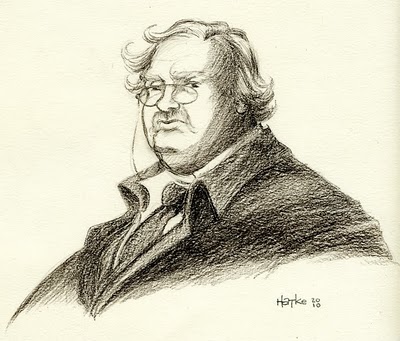 In an issue (April 2009) through which you don't have to root far to find something interesting, Midge Decter's review of Herbert London's new book, America's Secular Challenge: The Rise of a New National Relegion, is just a trough of references to our man, G.K Chesterton. She begins: "G. K. Chesterton once observed that people who cease to believe in God will not then believe in nothing but will rather believe in anything." Note that she did not quote Chesterton. Rather, she continues: "Who can offer better confirmation of what might have been Chesterton’s most brilliant aperçu than those of us living in the United States of America in the 21st century?" Aperçu? Over to The Free Dictionary -- (a discerning perception; an insight.) Perhaps Ms. Decter was aware of The Quotmeister's authoritative pronouncements on this particular Chesterton "quotation." To wit: "The Quotemeister has become convinced that the source of the fugitive quotation is Emile Cammaerts, whose ambiguous typography misled Christopher Hollis and through him others (including, at last, all of the rest of us) into the mistaken conviction that a thought repeated over and over by Chesterton had a specific epigrammatic form that Chesterton never precisely gave it."
In an issue (April 2009) through which you don't have to root far to find something interesting, Midge Decter's review of Herbert London's new book, America's Secular Challenge: The Rise of a New National Relegion, is just a trough of references to our man, G.K Chesterton. She begins: "G. K. Chesterton once observed that people who cease to believe in God will not then believe in nothing but will rather believe in anything." Note that she did not quote Chesterton. Rather, she continues: "Who can offer better confirmation of what might have been Chesterton’s most brilliant aperçu than those of us living in the United States of America in the 21st century?" Aperçu? Over to The Free Dictionary -- (a discerning perception; an insight.) Perhaps Ms. Decter was aware of The Quotmeister's authoritative pronouncements on this particular Chesterton "quotation." To wit: "The Quotemeister has become convinced that the source of the fugitive quotation is Emile Cammaerts, whose ambiguous typography misled Christopher Hollis and through him others (including, at last, all of the rest of us) into the mistaken conviction that a thought repeated over and over by Chesterton had a specific epigrammatic form that Chesterton never precisely gave it."And now, to quote further from the book review:
Herbert London’s catalogue of Chestertonian “anythings,” while brief, is impressively comprehensive. There is to begin with a seemingly everspreading conviction that unlike scientific truths, limited as every honest scientist recognizes they must necessarily be, the free-floating individual’s moral convictions are to be arrived at by no more humbling or instructive means than looking into his own conscience. Small wonder, then, as London points out, that this process so often results in an understanding not of what is good but rather of what is most convenient for him. And writ large, such a mindset (if one may for convenience be allowed to call it that) results with almost perfect directness in the idea that ultimately it is something called "the government" that must rightly be one’s brother's keeper of first, last, and ultimate resort. Now, apart from a long and sometimes very costly process of learning that government cannot satisfactorily serve as mankind's (or, for that matter, one's own) keeper, London reminds us that the very idea can be transformed from a mere refusal of responsibility into truly positive ugliness. He cites for an example the early 20th-century enthusiasm for that so-called science known as eugenics, which set out to improve mankind by manipulating the genetic stock of the world’s inferior peoples, especially but not exclusively people of color. Eugenics fortunately went the way of faith in séances (except of course in Auschwitz). Nevertheless the idea that to make men healthy, wealthy, and wise is first and foremost the responsibility of government has if anything become more firmly entrenched. By now, indeed, the philosophical as well as psychological refusal of individual moral responsibility has become no less than the founding credo of the new national religion referred to in London’s subtitle.And now I have to order the book from Amazon!



No comments:
Post a Comment